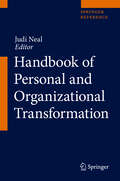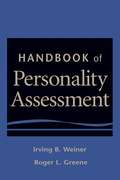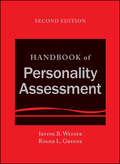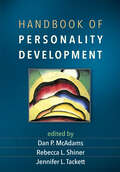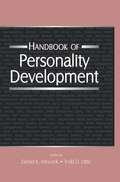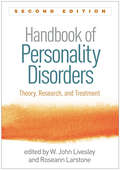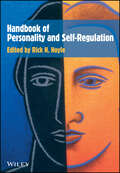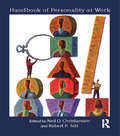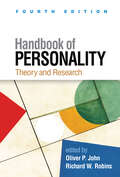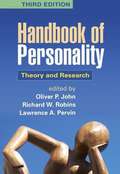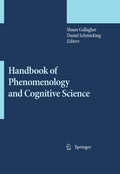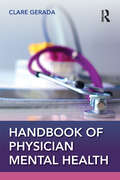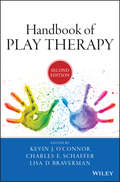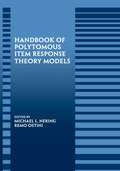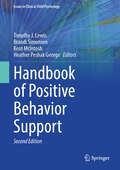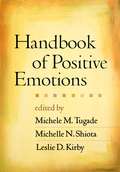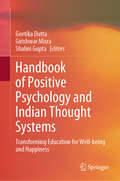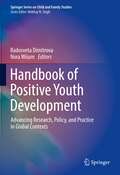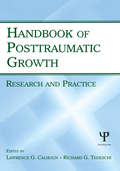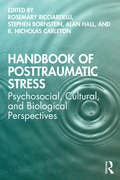- Table View
- List View
Handbook of Personal and Organizational Transformation
by Judi NealThis handbook is based on the premise that there can be no organizational transformation without personal transformation. Anything else is just moving the chairs around on the deck of the Titanic, and we see that all too often in organizations today. Einstein said that we cannot solve problems from the same mindset that created the problems. In order to see positive change occur in the world, we must shift our consciousness to a high level of thinking and being, but we must also have systems or approaches that scale up, so that there is a collective shift in consciousness in groups, work teams, villages, governments, and corporations. This handbook aims to draw the best and most creative thinking about the field of transformation in one place, to present a comprehensive overview of leading edge transformation theories and approaches for both the academic and the practitioner. In fact, the lines between academic and practitioner are becoming more and more blurred these days. Many management faculty also consult to organizations, a practice that deeply enriches their teaching and research. And many successful full-time consultants conduct high quality research to support their approaches and change initiatives. This Handbook aims to be a creative dialogue in this space that integrates transformation theory and practice. The Handbook of Personal and Organizational Transformation acknowledges the classic literature and principles that have informed the field to date, but primarily showcases authors who are on the cutting edge of new theories and new approaches to give us their latest thinking. Some of these ideas are conjecture about what is possible in human and organizational development. Some of these approaches are currently being tested in the field and may not yet have scientific results. And some of these theories and models have stunning results, but may not have been published in academic journals because the author is a practitioner instead of an academic, or because the concepts are a little too far out of the mainstream. The aim of this book is to expand the reader’s thinking and to encourage readers to be courageous about their involvement in creating transformation, at whatever level they feel called to do so. It will serve as an essential resource for researchers and students of organizational culture, leadership, and change management, as well as consultants, business and team leaders, and anyone interested in global trends and their impact on corporate culture.
Handbook of Personality Assessment
by Greene Weiner Irving B. Roger L.This comprehensive, balanced guide to personality assessment, written by two of the foremost experts in the field, is sure to become the gold standard of texts on this topic. The Handbook of Personality Assessment covers everything from the basics, including a historic overview and detailed discussion of the assessment process and its psychometric foundations, to valuable sections on conducting the assessment interview and the nature, interpretation, and applications of the most popular self-report (objective) and performance-based (projective) measures. A concluding section of special topics such as computerized assessment, ethical and legal issues, and report writing are unique to this text.
Handbook of Personality Assessment
by Irving B. Weiner Roger L. GreeneThe Handbook of Personality Assessment provides comprehensive guidance on the administration, scoring, and interpretation of the most widely-used instruments. Written by two of the field's foremost authorities, this well-balanced guide blends theory and application to provide a foundational reference for both graduate students and professionals. Updated to reflect the most current advances, this second edition includes new chapters on the Minnesota Personality Inventory-Restructured Form and the Rorschach Performance Assessment System, along with in-depth coverage of the MMPI-2, MMPI-2-A, MCMI-IV, PAI, NEO-PI-R, Rorschach Comprehensive System, TAT, and Figure Drawing and Sentence Completion Methods. Each instrument is discussed in terms of its history, administration, scoring, validity, assessment, interpretation, applications, and psychometric foundations, and other chapters address ethical considerations and provide general guidelines in the assessment process. Personality assessments guide recommendations in a broad range of clinical, health care, forensic, educational, and organizational settings. This book delves deeply into the nature and appropriate use of the major assessment instruments, with authoritative insight and practical guidance. Review the latest concepts, research, and practices Administer, score, and interpret the most widely-used instruments Understand the psychometric foundations of personality assessment Access downloadable sample reports that illustrate software interpretation An individual's nature and disposition can be assessed in several ways. This book focuses on standardized psychological tests that assess personality characteristics and indicate how a person is likely to think, feel, and act. The results can only be as accurate as the process, from assessment selection and administration, to scoring, interpretation, and beyond. The Handbook of Personality Assessment is an invaluable resource for every stage of the process, with a practical focus and advice from two leading experts.
Handbook of Personality Development
by Rebecca L. Shiner Jennifer L. Tackett Dan P. McAdamsBringing together prominent scholars, this authoritative volume considers the development of personality at multiple levels--from the neuroscience of dispositional traits to the cultural shaping of life stories. Illustrated with case studies and concrete examples, the Handbook integrates areas of research that have often remained disparate. It offers a lifespan perspective on the many factors that influence each individual's psychological makeup and examines the interface of personality development with health, psychopathology, relationships, and the family. Contributors provide broad-based, up-to-date reviews of theories, empirical findings, methodological innovations, and emerging trends. See also the authored volume The Art and Science of Personality Development, by Dan P. McAdams.
Handbook of Personality Development
by Todd D. Little Daniel K. MroczekThis handbook is the first volume to provide a comprehensive look at personality development. It features a state-of-the-art examination of the field, an area that is enjoying a resurgence in popularity. Five major types of advances, all of which are represented in this volume, are the result of the recent burst in research activity in this area: 1) new theoretical perspectives, 2) higher-quality empirical studies, 3) more sophisticated research designs and analyses, 4) attention to development across the lifespan, and 5) the growing prominence of interdisciplinary approaches to personality development. The Handbook of Personality Development is comprehensive across the lifespan, in its range of personality constructs, and in its coverage of theoretical and methodological frameworks. It is the first volume to address the most important personality development theoretical frameworks in one location--the evolutionary, physiological, behavioral genetic, and socio-cultural perspectives. The book also reviews new statistical techniques that allow for the estimation of individual differences in stability and the analysis of change. The latter part of the book focuses on personality development over the lifespan, from infancy to older adulthood. The authors address personality variables such as emotion regulation, temperament, and self-concept across the lifespan. The book concludes with a compelling capstone chapter by Dan McAdams on how personality develops. The Handbook of Personality Development provides an historical account of, and summary of, the most significant and important findings in the area, along with suggestions for future research.Intended for researchers and advanced students in personality, developmental, social, clinical, and educational psychology, as well as related fields such as family studies, sociology, education, nursing, behavioral genetics, neuropsychology, and psychophysiology, the handbook also serves as a valuable resource in advanced courses that address personality development.
Handbook of Personality Disorders, Second Edition: Theory, Research, and Treatment
by W. John Livesley Roseann LarstoneThe leading reference on personality disorders and their treatment, this authoritative work is now significantly revised with 80% new content reflecting important advances in the field. Preeminent experts provide in-depth coverage of conceptual and taxonomic issues, psychopathology, epidemiology and longitudinal course, etiology and development, and specific diagnoses. Diagnostic issues are explored and available assessment instruments discussed. All available evidence-based treatments are reviewed in consistently organized chapters that cover theoretical and empirical foundations as well as clinical strategies, facilitating comparison of the various approaches. New to This Edition *Incorporates more than 15 years of major research advances; includes 21 chapters on new topics. *Critically examines DSM-5 diagnostic criteria. *Chapters on additional treatments--mentalization-based treatment, schema-focused therapy, transference-based psychotherapy, and systems training for emotional predictability and problem solving. *Chapters on cutting-edge topics such as dimensional models, longitudinal studies, and personality pathology in children and adolescents. *Chapters on specific diagnoses: antisocial/psychopathic, borderline, and obsessive–compulsive personality disorder. *Integrative section introductions by the editors. See also Integrated Treatment for Personality Disorder, edited by W. John Livesley, Giancarlo Dimaggio, and John F. Clarkin, which weaves multiple well-established intervention strategies into a systematic modular approach.
Handbook of Personality and Self-Regulation
by Rick H. HoyleThe Handbook of Personality and Self-Regulation integrates scholarly research on self-regulation in the personality, developmental, and social psychology traditions for a broad audience of social and behavioral scientists interested in the processes by which people control, or fail to control, their own behavior. Examines self-regulation as it influences and is influenced by basic personality processes in normal adults Offers 21 original contributions from an internationally respected group of scholars in the fields of personality and self-regulation Explores the causes and consequences of inadequate self-regulation and the means by which self-regulation might be improved Integrates empirical findings on basic personality traits with findings inspired by emerging models of self-regulation Provides a comprehensive, up-to-date, and stimulating view of the field for students and researchers in a wide range of disciplines
Handbook of Personality at Work (Applied Psychology Series)
by Neil Christiansen Robert TettPersonality has emerged as a key factor when trying to understand why people think, feel, and behave the way they do at work. Recent research has linked personality to important aspects of work such as job performance, employee attitudes, leadership, teamwork, stress, and turnover. This handbook brings together into a single volume the diverse areas of work psychology where personality constructs have been applied and investigated, providing expert review and analysis based on the latest advances in the field.
Handbook of Personality, Fourth Edition: Theory and Research
by Oliver P. John Richard W. RobinsNow in a revised and expanded fourth edition, this definitive reference and text has more than 50% new material, reflecting a decade of theoretical and empirical advances. Prominent researchers describe major theories and review cutting-edge findings. The volume explores how personality emerges from and interacts with biological, developmental, cognitive, affective, and social processes, and the implications for well-being and health. Innovative research programs and methods are presented throughout. The concluding section showcases emerging issues and new directions in the field. New to This Edition *Expanded coverage of personality development, with chapters on the overall life course, middle childhood, adolescence, and early adulthood. *Three new chapters on affective processes, plus chapters on neurobiology, achievement motivation, cognitive approaches, narcissism, and other new topics. *Section on cutting-edge issues: personality interventions, personality manifestations in everyday life, geographical variation in personality, self-knowledge, and the links between personality and economics. *Added breadth and accessibility--42 more concise chapters, compared to 32 in the prior edition.
Handbook of Personality, Third Edition
by Richard Robins Oliver JohnThis authoritative handbook is the reference of choice for researchers and students of personality. Leading authorities describe the most important theoretical approaches in personality and review the state of the science in five broad content areas biological bases; development; self and social processes; cognitive and motivational processes; and emotion, adjustment, and health. Within each area, chapters present innovative ideas, findings, research designs, and measurement approaches. Areas of integration and consensus are discussed, as are key questions and controversies still facing the field.
Handbook of Phenomenology and Cognitive Science
by Shaun Gallagher Daniel SchmickingThe idea that phenomenology, in the European tradition, has something to offer the cognitive sciences is a recent development. Here, leading researchers address topics that lie at the intersection between phenomenological studies and the cognitive sciences.
Handbook of Physician Mental Health
by Clare GeradaThis definitive textbook on Practitioner Health mixes academic rigour with practitioner and patient experiences. The book covers all aspects of care relevant to any regulated health professional, focusing on the care of doctors and nurses with mental illness. The book builds on themes introduced in the award-winning publication Beneath the White Coat: Doctors, Their Minds and Mental Health from the same author. It provides an invaluable ‘how to manage’ companion to supplement and enhance the broader issues relating to doctors and mental illness addressed in that first book.Key Features Creates a thorough framework on how to assess a health professional with mental illness Includes evidence-based guidance on the diagnosis and management of common mental health problems in health professionals Supports an understanding of how the workplace affects mental health and how mental health affects work in the context of doctors working in a variety of settings Provides an understanding of the regulatory framework governing different health professionals Offers practical advice and guidance on primary prevention measures, including ‘how to spot doctors in distress’, ‘how to approach a doctor colleague to express concern’ and ‘how time and space can be developed within a department to address stress and burnout’ Drawing together 15 years of expertise in caring for more than 30,000 doctors with mental illness, the book is relevant to any health professional working in clinical practice and will be essential reading for those who regulate, appraise, train and support health practitioners across various disciplines.
Handbook of Play Therapy
by Lisa D. Braverman Kevin J. O'Connor Charles E. SchaeferA complete, comprehensive play therapy resource for mental health professionals Handbook of Play Therapy is the one-stop resource for play therapists with coverage of all major aspects written by experts in the field. This edition consolidates the coverage of both previous volumes into one book, updated to reflect the newest findings and practices of the field. Useful for new and experienced practitioners alike, this guide provides a comprehensive introduction and overview of play therapy including, theory and technique, special populations, nontraditional settings, professional and contemporary issues. Edited by the founders of the field, each chapter is written by well-known and respected academics and practitioners in each topic area and includes research, assessment, strategies, and clinical application. This guide covers all areas required for credentialing from the Association for Play Therapy, making it uniquely qualified as the one resource for certification preparation. Learn the core theories and techniques of play therapy Apply play therapy to special populations and in nontraditional settings Understand the history and emerging issues in the field Explore the research and evidence base, clinical applications, and more Psychologists, counselors, marriage and family therapists, social workers, and psychiatric nurses regularly utilize play therapy techniques to facilitate more productive sessions and promote better outcomes for patients. Handbook of Play Therapy provides the deep, practical understanding needed to incorporate these techniques into practice.
Handbook of Police Psychology
by Jack KitaeffThe Handbook of Police Psychology features contributions from over 30 leading experts on the core matters of police psychology. The collection surveys everything from the beginnings of police psychology and early influences on the profession; to pre-employment screening, assessment, and evaluation; to clinical interventions. Alongside original chapters first published in 2011, this edition features new content on deadly force encounters, officer resilience training, and police leadership enhancement. Influential figures in the field of police psychology are discussed, including America’s first full-time police psychologist, who served in the Los Angeles Police Department, and the first full-time police officer to earn a doctorate in psychology while still in uniform, who served with the New York Police Department. The Handbook of Police Psychology is an invaluable resource for police legal advisors, policy writers, and police psychologists, as well as for graduates studying police or forensic psychology.
Handbook of Polytomous Item Response Theory Models
by Michael L. Nering Remo OstiniThis comprehensive Handbook focuses on the most used polytomous item response theory (IRT) models. These models help us understand the interaction between examinees and test questions where the questions have various response categories. The book reviews all of the major models and includes discussions about how and where the models originated, conceptually and in practical terms. Diverse perspectives on how these models can best be evaluated are also provided. Practical applications provide a realistic account of the issues practitioners face using these models. Disparate elements of the book are linked through editorial sidebars that connect common ideas across chapters, compare and reconcile differences in terminology, and explain variations in mathematical notation. These sidebars help to demonstrate the commonalities that exist across the field. By assembling this critical information, the editors hope to inspire others to use polytomous IRT models in their own research so they too can achieve the type of improved measurement that such models can provide. Part 1 examines the most commonly used polytomous IRT models, major issues that cut across these models, and a common notation for calculating functions for each model. An introduction to IRT software is also provided. Part 2 features distinct approaches to evaluating the effectiveness of polytomous IRT models in various measurement contexts. These chapters appraise evaluation procedures and fit tests and demonstrate how to implement these procedures using IRT software. The final section features groundbreaking applications. Here the goal is to provide solutions to technical problems to allow for the most effective use of these models in measuring educational, psychological, and social science abilities and traits. This section also addresses the major issues encountered when using polytomous IRT models in computerized adaptive testing. Equating test scores across different testing contexts is the focus of the last chapter. The various contexts include personality research, motor performance, health and quality of life indicators, attitudes, and educational achievement. Featuring contributions from the leading authorities, this handbook will appeal to measurement researchers, practitioners, and students who want to apply polytomous IRT models to their own research. It will be of particular interest to education and psychology assessment specialists who develop and use tests and measures in their work, especially researchers in clinical, educational, personality, social, and health psychology. This book also serves as a supplementary text in graduate courses on educational measurement, psychometrics, or item response theory.
Handbook of Positive Behavior Support (Issues in Clinical Child Psychology)
by Timothy J. Lewis Kent McIntosh Brandi Simonsen Heather Peshak GeorgeThis Second Edition of the handbook reflects the expanding growth and sophistication in research on positive behavior support (PBS). It synthesizes a large body of related research and is organized around school, district, and statewide multitiered systems of support logic that is widely prevalent in the field. The handbook organizes chapters into a powerful, dynamic knowledge base that covers theory, research, and applications. In addition, it offers a set of foundational chapters as well as addresses future directions in research and practice. Key areas of coverage include: Foundations and essential features of PBS. Implementation of PBS across K-12 educational settings. Program implementation (e.g., early childhood and alternative settings). Capacity building using PBS. The Handbook of Positive Behavior Support, Second Edition, a must-have resource for researchers, professors, and graduate students as wellas clinicians, therapists, and other professionals and practitioners in developmental, clinical child, and school psychology, social work, public health, child and adolescent psychiatry, family studies, pediatrics, and all related disciplines.
Handbook of Positive Emotions
by Barbara L. Fredrickson Michele M. Tugade Leslie D. Kirby Michelle N. ShiotaThis authoritative handbook reviews the breadth of current knowledge about positive emotions: their nature, functions, and consequences for individuals and society. Specific emotions are analyzed in depth, including happiness, pride, romantic love, compassion, gratitude, awe, challenge, and hope. Major theoretical perspectives are presented and cutting-edge research methods explained. The volume addresses neurobiological and physiological aspects of positive emotions as well as their social and intrapersonal contexts. Implications for physical health, coping, and psychopathology are explored, as are connections to organizational functioning and consumer behavior.
Handbook of Positive Psychology and Indian Thought Systems: Transforming Education for Well-being and Happiness
by Girishwar Misra Geetika Dutta Shalini GuptaThis handbook explores the intersection of positive psychology and Indian thought systems in education to create a generation of future citizens who are not only well-educated but also happy and well-rounded. It discusses mental hygiene, well-being, flow, resilience, gratitude, happiness, mindfulness, and happiness curriculum. With contributions from esteemed scholars and practitioners, this book offers comprehensive coverage of positive psychology, Indian thought systems, and their applications in education. It bridges the gap between theory and practice, providing readers with the knowledge and tools to create positive educational experiences that promote well-being, resilience, and happiness. The book is a valuable academic resource for practitioners and students in psychology, educational psychology and education. It is also helpful for parents, educators and anyone interested in promoting well-being and eternal happiness in our educational institutions and society.
Handbook of Positive Psychology in Schools: Supporting Process And Practice (Educational Psychology Handbook)
by Michael J. Furlong Rich Gilman E. Scott HuebnerUnderstanding the factors that encourage young people to become active agents in their own learning is critical. Positive psychology is one lens that can be used to investigate the factors that facilitate a student’s sense of agency and active school engagement. In the second edition of this groundbreaking handbook, the editors draw together the latest work on the field, identifying major issues and providing a wealth of descriptive knowledge from renowned contributors. Major topics include: the ways that positive emotions, traits, and institutions promote school achievement and healthy social and emotional development; how specific positive-psychological constructs relate to students and schools and support the delivery of school-based services; and the application of positive psychology to educational policy making. With thirteen new chapters, this edition provides a long-needed centerpiece around which the field can continue to grow, incorporating a new focus on international applications of the field.
Handbook of Positive Psychology in Schools: Supporting Process and Practice (Educational Psychology Handbook)
by Kelly-Ann AllenThe Handbook of Positive Psychology in Schools offers the most current and comprehensive insights into how positive psychology principles provide a framework for young people to become active agents in their own learning. The third edition of this groundbreaking volume assembles the latest global research identifying fundamental assets—hope, optimism, gratitude, self-efficacy, emotional regulation, among others—that support students’ learning and well-being. Chapters examining social-ecological perspectives on classroom quality and school climate provide best practice guidance on schoolwide policies and practices. These 35 new chapters explore positive psychology’s ongoing influence and advances on prevention, intervention, and assessment practices in schools.
Handbook of Positive Psychology, Religion, and Spirituality
by Everett L. Worthington Edward B. Davis Sarah A. SchnitkerThis handbook aims to bridge the gap between the fields of positive psychology and the psychology of religion and spirituality. It is the authoritative guide to the intersections among religion, spirituality, and positive psychology and includes the following sections: (1) historical and theoretical considerations, (2) methodological considerations, (3) cultural considerations, (4) developmental considerations, (5) empirical research on happiness and well-being in relation to religion and spirituality, (6) empirical research on character strengths and virtues in relation to religion and spirituality, (7) clinical and applied considerations, and (8) field unification and advancement. Leading positive psychologists and psychologists of religion/spirituality have coauthored the chapters, drawing on expertise from their respective fields. The handbook is useful for social and clinical scientists, practitioners in helping professions, practitioners in religious and spiritual fields, and students of psychology and religion/spirituality.This is an open access book.
Handbook of Positive School Psychology: Evidence-Based Strategies for Youth Well-Being (Advances in Mental Health and Addiction)
by Gökmen Arslan Murat YıldırımStudents spend significantly more time in school compared to any other formal institution during their lives; therefore, mental health in schools has attracted a lot of attention in recent years. According to Seligman et al. (2009), positive psychology in school is a response to the gap between what people want for their children and what schools teach. That is, most parents want their children to be happy, healthy, and confident, but schools only focus on achievement, discipline, and academic skills. These are of course important, but so are positive mental health outcomes. To fix this gap, schools must teach achievement and accomplishment along with positive psychology-informed mental health skills. In other words, positive education aims to bring positive psychology’s goals of well-being and mental health support for everyone into the school setting.Psychological interventions have been around in schools since at least the 1930s. Therefore, it makes sense to supplement the already-existing traditional psychology in schools with positive psychology. In the field of psychology, positive psychology interventions are defined as those aimed at raising positive feelings, positive thoughts, and positive behaviour and increasing well-being. Positive Psychology Interventions in schools have been shown to improve mental health and well-being outcomes for students. Recent research has confirmed the same results, as offering emotional support early in a school year can lead to improved instructional quality later in that school year. In other words, positive school psychology interventions offer a focus on mental health in order to set the stage and give students the opportunity for academic achievement. Since the beginning of the positive psychology movement, the application of its assumptions in schools has been one of the movement’s main pillars. The objective of the book is to help counsellors, teachers, and school leaders engage in a positive psychology research-based practice in schools.
Handbook of Positive Youth Development: Advancing Research, Policy, and Practice in Global Contexts (Springer Series on Child and Family Studies)
by Radosveta Dimitrova Nora WiiumThis handbook examines positive youth development (PYD) in youth and emerging adults from an international perspective. It focuses on large and underrepresented cultural groups across six continents within a strengths-based conception of adolescence that considers all youth as having assets. The volume explores the ways in which developmental assets, when effectively harnessed, empower youth to transition into a productive and resourceful adulthood. The book focuses on PYD across vast geographical regions, including Europe, Asia, Africa, Middle East, Australia, New Zealand, North America, and Latin America as well as on strengths and resources for optimal well-being. The handbook addresses the positive development of young people across various cultural contexts to advance research, policy, and practice and inform interventions that foster continued thriving and reduce the chances of compromised youth development. It presents theoretical perspectives and supporting empirical findings to promote a more comprehensive understanding of PYD from an integrated, multidisciplinary, and multinational perspective.The Handbook of Positive Youth Development in a Global Context is an essential resource for researchers, professors, and graduate students as well as clinicians, therapists, and other professionals in developmental, clinical child, and school psychology, public health and prevention science, family studies, cross-cultural psychology, child and adolescent psychiatry, social work, educational policy and politics, anthropology, sociology, social psychology and all interrelated disciplines.
Handbook of Posttraumatic Growth: Research and Practice
by Lawrence G. Calhoun and Richard G. TedeschiPosttraumatic growth is an area in which investigations are now being undertaken in many different parts of the world. The view that individuals can be changed--sometimes in radically good ways--by their struggle with trauma is ancient and widespread. However, the systematic focus by scholars and clinicians on the possibilities for growth from the struggle with crisis is relatively recent. There are now a growing number of studies and scholarly papers on the antecedents, correlates, and consequences of posttraumatic growth, and there are also theoretical models that can help guide the research further. It is clear, however, that this phenomenon is not yet well understood.The Handbook of Posttraumatic Growth: Research and Practice provides both clinicians and researchers with a comprehensive and up-to-date view of what has been done so far. In addition, it uses the foundations of what has been done to provide suggestions for the next useful steps to take in understanding posttraumatic growth. The book offers contributions of important and influential scholars representing a wide array of perspectives of posttraumatic growth. This volume serves as an impetus for additional work, both in the academic aspects and in the possibilities for clinical applications of posttraumatic growth.This Handbook will appeal to students, practitioners, and researchers working in a broad array of disciplines and human services.
Handbook of Posttraumatic Stress: Psychosocial, Cultural, and Biological Perspectives
by Rosemary RicciardelliThe Handbook of Posttraumatic Stress provides a comprehensive review of posttraumatic stress in its multiple dimensions, analyzing causation and epidemiology through prevention and treatment. Written by a diverse group of scholars, practitioners, and advocates, the chapters in this book seek to understand the history, the politics, and the biological, psychological, and social processes underlying posttraumatic stress disorder (PTSD). Featuring studies that focus on some of the most seriously affected occupational groups, the text examines topics such as how individuals experience PTSD in different work settings and the complexities of diagnosis, treatment, and recovery for those workers and their families. Together, the contributions provide an in-depth examination of the current understood causes, impacts, and treatments of and for posttraumatic stress, mobilizing academic, administrative, and clinical knowledge, and lived experience to inform ongoing and future work in the field. Drawing from range of different topics, fields of study, and research methods, this text will appeal to readers across medical, mental health, and academic disciplines.
